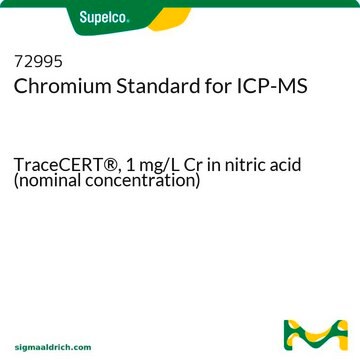ERMBC211
Rice flour (Total As and As species)
ERM®, certified reference material
Sign Into View Organizational & Contract Pricing
All Photos(1)
About This Item
UNSPSC Code:
77101502
NACRES:
NA.24
Recommended Products
grade
certified reference material
Agency
ERM®
manufacturer/tradename
JRC
application(s)
food and beverages
format
matrix material
storage temp.
−20°C
General description
Certified for the mass fractions of total arsenic, the sum of arsenite/arsenate and dimethylarsinic acid
Analysis Note
For more information please see:
ERMBC211
ERMBC211
Other Notes
Certified for the analytes listed below. See certificate for values and more details
Trace Elements / Metallorganics: Dimethylarsinic acid, Total Arsenic (As), The sum of arsenite and arsenate
Matrix Group: Nuts, Soy, Edible Oils and Fats
Trace Elements / Metallorganics: Dimethylarsinic acid, Total Arsenic (As), The sum of arsenite and arsenate
Matrix Group: Nuts, Soy, Edible Oils and Fats
Legal Information
ERM is a registered trademark of European Commission
Storage Class Code
11 - Combustible Solids
WGK
WGK 3
Flash Point(F)
Not applicable
Flash Point(C)
Not applicable
Choose from one of the most recent versions:
Certificates of Analysis (COA)
Lot/Batch Number
Sorry, we don't have COAs for this product available online at this time.
If you need assistance, please contact Customer Support.
Already Own This Product?
Find documentation for the products that you have recently purchased in the Document Library.
Customers Also Viewed
Stanislav Musil et al.
Analytical chemistry, 86(2), 993-999 (2013-12-21)
Because of the toxicity of inorganic arsenic (iAs), only iAs needs to be monitored in food and feedstuff. This demands the development of easy and quick analytical methods to screen large number of samples. This work focuses on hydride generation
Fang-Jie Zhao et al.
Environmental science & technology, 47(9), 3957-3966 (2013-03-26)
Rice is a major source of inorganic arsenic (iAs) in the human diet because paddy rice is efficient at accumulating As. Rice As speciation is dominated by iAs and dimethylarsinic acid (DMA). Here we review the global pattern in rice
Toni Llorente-Mirandes et al.
Food chemistry, 147, 377-385 (2013-11-12)
The present study arose from the need to determine inorganic arsenic (iAs) at low levels in cereal-based food. Validated methods with a low limit of detection (LOD) are required to analyse these kinds of food. An analytical method for the
Kongkea Phan et al.
Environmental pollution (Barking, Essex : 1987), 185, 84-89 (2013-11-16)
We investigated total daily intake of As by residents in Prey Veng province in the Mekong River basin of Cambodia. Groundwater (n = 11), rice (n = 11) and fingernail (n = 23) samples were randomly collected from the households and analyzed for total As by
Guoying Chen et al.
Talanta, 119, 202-206 (2014-01-10)
Due to high toxicity, inorganic arsenic (iAs) species are the focus of monitoring effort worldwide. In this work arsenic was first extracted from rice by microwave-assisted digestion in HNO3-H2O2, during which As(III) was oxidized to As(V). Silica-based strong anion exchange
Our team of scientists has experience in all areas of research including Life Science, Material Science, Chemical Synthesis, Chromatography, Analytical and many others.
Contact Technical Service





